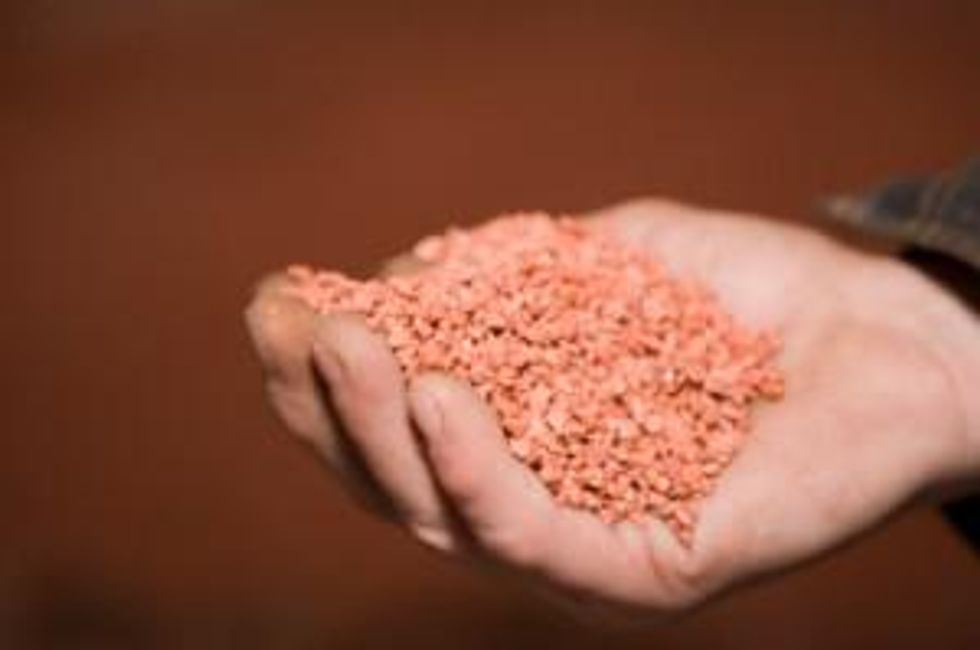Caution from one of the world’s largest potash producers is likely to temper 2013 potash demand figures, but will not significantly change projected growth for the industry as a whole.
After its 2012 financial results, released on April 10, showed that its 2012 revenues fell by 6 percent, to $3.95 billion, Uralkali told investors that weak Indian potash demand and unfavorable weather conditions in select regions will temper overall demand this year.
Uralkali projects that global potash demand in 2013 will hit 53 to 54 million metric tons (MT), slightly higher than 2012’s 51 million MT, but lower than earlier projections from analysts and other potash producers.
US fertilizer giant Mosaic (NYSE:MOS) released more optimistic numbers for 2013 in its Q3 results, projecting that demand will settle between 55 and 57 million MT in 2013, according to The Globe and Mail.
“We expect producer inventories to be drawn down in coming months as North American dealers prepare for what is likely to be a very strong application season,” Mosaic’s CEO, Jim Prokopanko, said in the late March release.
So far this year, North American potash production has grown compared to 2012, with data from Potash Corporation of Saskatchewan (TSX:POT,NYSE:POT) showing a second straight month of production increases: 1.971 million MT of potassium chloride were produced in March, 20 percent higher than February and 37 percent higher than the same period last year.
Sales of potash have seen more mixed trends, with domestic North American sales falling 13 percent in March, while exports grew by 59 percent, to 1.286 million MT, for the same period, according to PotashCorp data.
Continued confidence in 2013 and beyond
Despite urging caution, Uralkali nevertheless believes that potash prices will rise in 2013, with demand improving in the latter half of the year on the back of “high planted US corn acreage and very healthy farmer finances,” Agrimoney reported.
Uralkali has also shown its continued confidence in long-term demand for potash by announcing that it intends to dramatically increase its potash production by 2020.
The Wall Street Journal cited an Interfax report, released this week, that shows that Uralkali plans to invest $5.4 billion to expand its capacity by around 50 percent by 2020 — up from 13 million MT of potassium chloride to 19 million MT.
While potash majors like Uralkali, Mosaic and PotashCorp continue to build up their potash assets, many new producers are expected to play a growing role in meeting the demand that is projected for the coming years.
Company news
At its annual general meeting, Agrium (TSX:AGU,NYSE:AGU) was successful in getting all of its 12 nominees elected to its board, The Calgary Herald reported. The victory was significant for Agrium as it prevented the five nominees supported by Jana Partners, a New York-based hedge fund that owns a 7.5-percent stake in Agrium, from gaining influence over the company.
Jana has called for “better cost control, governance, and capital management” at Agrium and controversially proposed that Agrium spin off its retail division. Agrium has resisted these proposals on the grounds that Jana is “using Trojan horse tactics” to try to break up the company.
While some believe that Jana will challenge the election outcome in court, others are of the opinion that the company will move on. Michael Wilson, CEO of Agrium, declined to speculate on what will happen next, The Calgary Herald reported.
Junior company news
Encanto Potash (TSXV:EPO) raised C$2.703 million in a private placement of 7.95 million common shares of company stock last week. The company plans to use the proceeds to support its Muskowekwan First Nation property, which is located 100 kilometers northeast of Regina, Saskatchewan.
The financing comes on the heels of the Canadian government’s acceptance of Encanto’s plan to develop the first on-reserve potash mine in Canada in Muskowekwan First Nation traditional territory.
Encanto, working with Muskowekwan Resources, recently released a prefeasibility study for the Muskowekwan property and is targeting a 2014 construction start date for the 2.8-million-MT-per-year, 50-year mine, with production beginning by 2017.
MBAC Fertilizer (TSX:MBC,OTCQX:MBCFF) completed a previously announced bought-deal private placement for gross proceeds of $51.7 million, selling 23.5 million common shares of the company for $2.20 per share. The company plans to use the money in part to complete the Itafos project.
Prospect Global Resources (NASDAQ:PGRX) successfully restructured its long-term debt with the Karlsson Group, allowing its long-term plan to build a potash mine in Arizona’s Holbrook Basin to move forward. Highlights include the extension of debt maturity to July 2015, with the $30-million interim principal payment due January 2015.
Damon Barber, Prospect’s president and CEO, commented, “[d]espite the recent volatility in our stock price, we believe that we are now well positioned to move forward in building long-term value for all shareholders.”
Securities Disclosure: I, James Wellstead, hold no direct investment interest in any company mentioned in this article.
Related reading:
